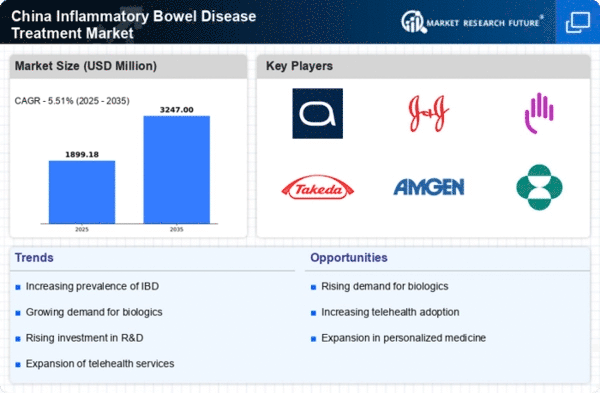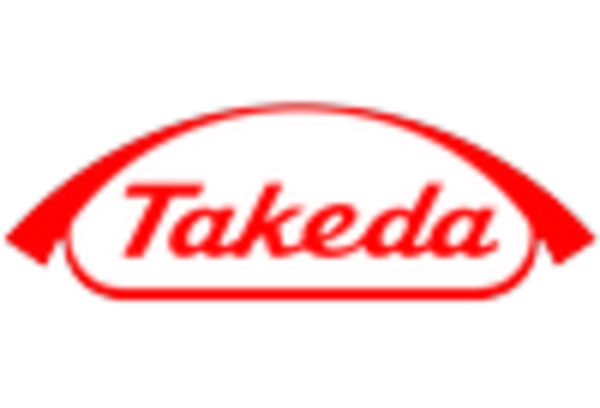Rising Healthcare Expenditure
The increase in healthcare expenditure in China is a significant driver for the inflammatory bowel-disease-treatment market. As the country continues to develop economically, healthcare spending has risen, with estimates indicating that it could reach approximately $1 trillion by 2025. This increase allows for better access to advanced treatment options and medications for patients suffering from IBD. Moreover, the growing middle class is more willing to invest in healthcare, leading to higher demand for effective treatments. Consequently, the inflammatory bowel-disease-treatment market is likely to benefit from this upward trend in healthcare expenditure, facilitating the introduction of new therapies and improving patient outcomes.
Government Initiatives and Support
Government initiatives aimed at improving healthcare access and treatment options are pivotal for the inflammatory bowel-disease-treatment market. In China, the government has implemented various policies to enhance healthcare infrastructure and promote research in chronic diseases, including IBD. Funding for research and development in this area has increased, with the government allocating substantial resources to support clinical trials and the introduction of new therapies. This support is likely to foster innovation and expand the range of available treatments, thereby benefiting patients and healthcare providers alike. As a result, the inflammatory bowel-disease-treatment market is expected to experience growth driven by these supportive government measures.
Increasing Awareness and Diagnosis
The rising awareness of inflammatory bowel disease (IBD) among healthcare professionals and the general public is a crucial driver for the inflammatory bowel-disease-treatment market. Enhanced education initiatives and campaigns have led to earlier diagnosis and treatment, which is vital for managing the disease effectively. In China, the number of diagnosed cases has increased, with estimates suggesting that approximately 1.5 million individuals are affected by IBD. This growing patient population necessitates a broader range of treatment options, thereby stimulating market growth. Furthermore, as awareness continues to expand, more patients are likely to seek medical attention, contributing to the demand for innovative therapies and medications in the inflammatory bowel-disease-treatment market.
Technological Innovations in Treatment
Technological advancements in the field of medicine are significantly influencing the inflammatory bowel-disease-treatment market. Innovations such as biologics and biosimilars have transformed treatment protocols, offering more effective and targeted therapies for patients. In China, the market for biologics is projected to grow at a CAGR of around 15% over the next five years, reflecting the increasing adoption of these therapies. Additionally, the development of digital health technologies, including telemedicine and mobile health applications, is enhancing patient management and adherence to treatment regimens. These technological innovations not only improve patient outcomes but also drive the demand for new treatment options within the inflammatory bowel-disease-treatment market.
Growing Research and Development Activities
The surge in research and development activities focused on inflammatory bowel disease is a critical driver for the inflammatory bowel-disease-treatment market. In China, numerous pharmaceutical companies and research institutions are investing in the development of novel therapies and treatment protocols. This focus on R&D is essential for addressing the unmet medical needs of IBD patients and is expected to lead to the introduction of innovative treatment options. With the increasing prevalence of IBD, the demand for effective therapies is likely to rise, prompting further investment in research initiatives. As a result, the inflammatory bowel-disease-treatment market is poised for growth, driven by these ongoing research efforts.
















